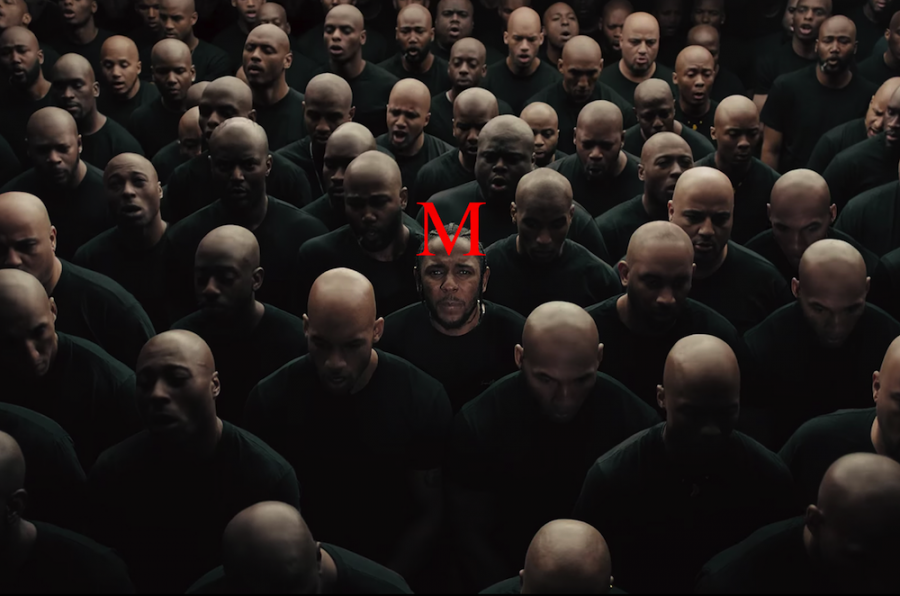Kendrick humbles the competition with a “DAMN.” good album
Kendrick Lamar’s new release of DAMN. brings listeners to both their feel and their feels.
April 18, 2017
After the release of his single “HUMBLE.,” the hip hop world has been buzzing with anticipation for Kendrick Lamar’s new album DAMN., which cropped on April 14.
According to Lamar, the album should “have a more commercial sound” compared to his critically-acclaimed earlier albums good kid M.A.A.D. City and To Pimp a Butterfly. Departing from both the old-school sound of good kid, and three jazz-influenced looser construction of To Pimp A Butterfly, DAMN. incorporates a more contemporary sound, drawing from trap, folk-rock, gangsta rap, and gospel. However, despite this departure in sound, Kendrick maintains his political and social insight, even sampling two news anchors who criticized his last album on “BLOOD.” to reaffirm his commitment to cultural commentary.
DAMN. takes a radical departure from the narrative format of Kendrick’s two previous albums, instead using a more abstract, cyclical style, focusing his internal dualities. The album proceeds with no particular chronological order, only bookended by the first track and the last track, representing, respectively, the end and beginning of his life. Kendrick hinted that DAMN. would discuss his religion and faith, but in reality, it reaches much wider than that. Kendrick lays down an intimate portrait of his personal struggles in his public and private lives.
Throughout the album, Kendrick contrasts his public and private lives, forming one of the two major contrasts of the album; for examples, see “PRIDE.” and “HUMBLE.” “LUST.” and “LOVE.” demonstrate the second major contrast of the album, between heaven and hell.
In “PRIDE.,” Kendrick raps about his internal flaws, and his cynicism about humanity and the world. He admits that he “wouldn’t blame [the world] for mistakes I made, or the bed I laid,” pinning all the blame for his failures solely on himself. He also discusses his deep skepticism of all humans, and humanity in general, and the inherent corrupting power of the material world.
In “PRIDE.,” hell is Kendrick’s inner life, full of depression, sadness, sin, and guilt. He ends the track with a thematic lead in to the next, saying, in one of the most memorable lines in the album, that “in a perfect world, [he’d] choose faith over riches, [he’d] choose work over b*****s, [he’d] make schools out of prison.”
Contrasting with the ironically humble, self-deprecating, and insightful nature of “PRIDE.” (representing Kendrick’s private, inner life), “HUMBLE.” starts with a jarring disc scratch, where Kendrick transitions to his public life, celebrating all of the material riches he decried in the last track, forming a “heaven” to contrast the “hell” on “PRIDE.”
“LUST.” and “LOVE.” explore this heaven and hell dichotomy in a completely different manner. “LUST.,” which comes directly after “HUMBLE.,” takes the public partying and celebration of riches and flips it on its head. “LUST.” portrays the world of partying and excess which Kendrick celebrates on “HUMBLE.” as a nihilistic, apathetic wasteland of hedonism, rapping in a monotone, passionless voice about snapshots of depressed, aimless, drug-addled pleasure-seeking completely devoid of all deeper meaning.
Also contrasting the previous pair, “LOVE.” shows the private life that Kendrick laments in “PRIDE.” as a source of everlasting, pure happiness, separate from the corrupting influence of the material world that Kendrick previously explored.
Channeling 50 cent, Kendrick repeatedly asks his lover to confirm that the pleasures of the material world, and Kendrick’s access to them due to his wealth and fame, do not tempt her as they do him, and she only loves him for him. This reversal provides commentary for the entire album, showing that despite the dualities of Kendrick’s private and public lives, he cannot fully condemn or praise either as wholly good or evil, like heaven or hell.
This theme of disconnected duality pervades the entire album, inviting viewers to consider the subjects Kendrick brings up, and come to their own moral judgements based on their experiences. However, even with this subjectivity, DAMN. is by far Kendrick’s most personal album, featuring much less political commentary than any of his other albums.
Tellingly, Kendrick titles the last two tracks of the album “GOD.” and “DUCKWORTH.” At the beginning, Kendrick (born Kendrick Lamar Duckworth) asks us to see the stark differences he sees between the ultimate perfection and himself, ending on a somewhat depressing note, as he rewinds back to his death on the first track. In many respects, DAMN. serves as Kendrick’s final will and testament, or his thoughts immediately after someone kills him. He explores down to the very depth of his person and ruminates on his life, asking listeners to take on the role of Saint Peter in declaring him good or evil.
“And I can’t take these feelings with me so hopefully they disperse / within fourteen tracks, carried out over wax / searchin’ for resolutions until somebody get back,” he said.
As far as DAMN. goes, it quickly earns a declaration of “good.”
The Chant’s Grade: A

















